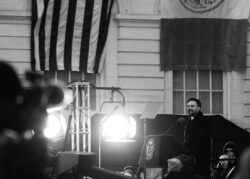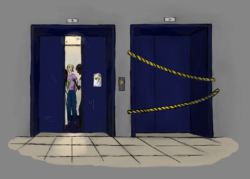My dad called the bartender “maestro” as he led me through the crowd at Dominic’s, a crowded, family-style Italian restaurant in the Bronx.
“I remember that guy,” I said to him with a narrow smile.
Turning to me, he said, “That’s John. He’s always been here.”
I raised my eyebrows and shook my head, surprised that dad remembered his name.
My brother and I often tell each other, sometimes even my Dad, that he’s lost it, that he’s getting closer to developing dementia like his father did. My mom insists he’s already there.
Although it was probably not the first time that my dad, brother and I had dined at Dominic’s without mom, it sure felt like it.
Four summers ago, my then 58 year-old dad moved out of our old house as he and my mom began the process of getting divorced. He wore a fuller, greyer beard then, though he hadn’t had hair on the top of his head since he was 25.
Since then, my mom, brother and sister only seem to remember my Dad’s worst moments. Though I acknowledge that my father has made a lot of mistakes, I have always defended him. For some reason I don’t remember the bad times as vividly as I remember the good ones.
My dad took a number from the hostess and we walked down the dining hall’s only aisle to wait, toward the back stairs, passing strangers squeezed in close to one another. As we passed, I drooled over plates of antipasto, rigatoni and sausage in red sauce and loaves of Tara nova bread, hungry from the half-hour drive after an August extra-innings game at Yankee Stadium.
We drank Peronis as we waited upstairs for number 23 to be called. But even before the beers, my permanently hyperactive, uptight father was already loose.
Like always, I was relatively silent compared to him. I watched the small, fuzzy TV as he plied me with questions I wasn’t interested in answering. Too busy thinking about his next question, he never listens to the response to the one he is asking. But tonight, he gave up quickly and we soon settled into a peaceful silence.
When we finally sat at our table, I devoured a piece of bread and searched the room for a waiter. I was relieved when a stocky, Italian server finally arrived.
“Whadaya got tonight?” my father asked.
My dad didn’t care what we got—it was up to my brother and me. We ended up ordering a large salad to start, a big pasta dish and some meat.
After we finished our salad, my dad began a conversation with the couple that shared our table. They were from Los Angeles and they had found Dominic’s and the surrounding Arthur Avenue neighborhood, famous for its authentic Italian food, in the Fodor’s guide to New York.
That night, my father reminded me that he can be charming, though never gracious—he screamed, though the couple sat right next to us. I used to hate how loud he was when I lived with him, but I have learned to laugh at my father’s unnecessary boisterousness.
The woman asked my dad if a nearby restaurant, Umberto’s, was good. Dad told them it was stuck-up and expensive. They mentioned some other place, but Dad told them it sucked.
“You picked the right one,” my father told them.
Then they asked about Arthur Ave.’s best bakeries.
“There used to be one around the corner, but I think it’s closed,” my dad said. “There’s still a pretty good bakery about three blocks away, though. And if you want the best cappuccino, go next door.”
The Californian couple probably thought we lived up the street. Throughout the night, my dad was very focused—he didn’t seem to be losing it at all.
He was not the screw-up who wrote the wrong zip code on my brother’s trunks destined for summer camp, forcing UPS to send the luggage all the way around the world before it finally returned to our house three months later.
Later, I asked my dad how he still knew the neighborhood so well, considering that I was a little kid the last time he took me to Arthur Ave.
He simply shrugged and gave a big smile.




